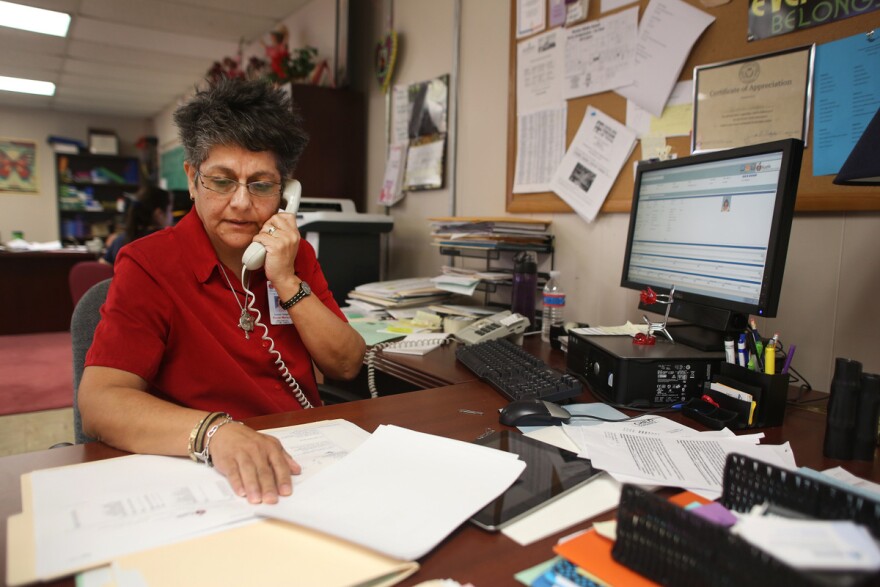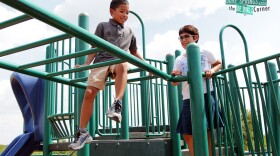In Austin’s Dove Springs neighborhood, it’s no secret: the middle school there – Mendez Middle School – has challenges. Before last year, Mendez was rated academically unacceptable and faced the struggles found in many low income schools: low test scores, little parental involvement, and chronic absenteeism.
In many cases, the burden of maintaining order at Mendez falls on the shoulders of teachers. Many start their day corralling kids inside the building and greeting them at the front door.
“They’re outside everyday. Every kid that walks in the door, they shake their hand and they tell them, ‘have a great day,'" Dove Springs resident and former Mendez parent volunteer Robert Kibbie says.
Kibbie's daughter, Brenda, graduated from Mendez last year. She went from needing tutoring, to graduating with honors.
“If I needed help, they would stay or help get more information to me," Brenda says. She now attends Akins High School.
Once the school day begins at Mendez, teachers face a lot of challenges:
“Dove Springs has a reputation," former Mendez teacher Sheila Rae says. "It’s not our movie picture of the ghetto school, but it’s a challenge to be a teacher there, definitely.”
Rae worked at Mendez for nine years before retiring in 2011. She taught for a total of 32 years and has had her share of experiences.
In the past, one of the issues at Mendez was student discipline, which gave the school a bad reputation in the neighborhood. There were stories of fights, gang activity and drug possession. Last year, nearly a quarter of Mendez students were suspended multiple times – that's according to data from the school district. The data also shows, on average, a student brought a knife onto the campus more than once a month. But district data also shows the number of recorded disciplinary offenses was cut in half between 2011 and 2012.
Teachers face other challenges surrounding poverty. Ninety-four percent of students at Mendez are on free or reduced lunch. Often, teachers find simple things – like getting in touch with parents – can be difficult. Once a teacher does connect with a parent, he or she may not speak English. More than 90 percent of Mendez Middle School students are Hispanic. If a teacher doesn’t speak Spanish, a district-provided translator is required.
“It takes longer to handle all of that and time passes and the problem persists in the classroom and all of those things get tied and mangled together to make it more of a challenge," Rae says.
All of the issues combined means teachers face a lot of responsibility.
"We’re the ones who are going to advocate for those kids, demand they behave appropriately and hope we get administrative support for it and even district support," Rae says.
When challenges become too much for one teacher to handle, the school relies on the Family Resource Center, run by the Austin Project, a local non-profit that also runs another Family Resource program within the district. Located in a portable on campus, it’s become a place where students and families can come for basic needs such as food and clothing as well as outside services like health care or electricity.
"When a student is not hungry in class they’re going to learn, studies show that. When they’re not worrying about electricity or sleeping on a floor they’re going to be more attentive," Family Resource Center director Leonor Vargas says.
The Family Resource Center depends on teachers to identify students who might need help, but often students will reach out for services themselves.
“There is more of a [question of] 'why?' Sometimes you can’t answer that ‘why’ question, you can’t! And sometimes, as providers, we have to say to our students, “I don’t know why things are the way things are. But we have confidence in you that if you have a dream and you’re willing to get the help and be willing to meet us halfway at least and do your part…we shall rise above all this,” Vargas says.
Inside the Family Resource center there is a sign that reads, "No papers, no fear!" It's one of the ways the center tries to ease families' fears so they feel comfortable enough to ask for help. The impact of the center is obvious. On one shelf sits gifts from family members expressing gratitude.
Vargas says the challenges in Dove Springs will not go away overnight, but the school and the community are heading in the right direction. Last year, Mendez was rated academically acceptable for the first time in several years. It made big gains in its standardized reading scores.
“We were a cocoon and now we’re butterflies, we’re seeing a lot of soaring happening," she says.




